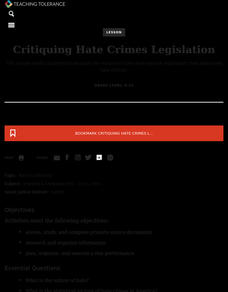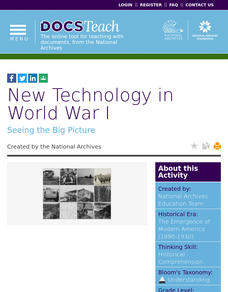EngageNY
Analyzing Events: Carlotta’s Journey
How does one talk silently? Class members participate in a silent communication activity known as a Chalk Talk. During the activity, they answer text-dependent questions analyzing Carlotta’s Journey. They use markers and chart paper to...
EngageNY
Mid-Unit Assessment: Classifying and Evaluating Primary Sources
Let's go for a walk. Learners complete the mid-unit assessment by completing a gallery walk to analyze different primary sources discussed while reading A Mighty Long Way. After viewing the sources, class members complete organizers and...
EngageNY
Language Analysis: “I Have a Dream”
Middle schoolers look closely at Martin Luther King Jr's "I Have a Dream" speech and use a language analysis sheet to determine if King's sentences use active or passive voice. They then move their attention back to A Mighty Long Way to...
Curated OER
1863: Shifting Tides
The victory at Gettysburg is forever immortalized in the famous speech given by Present Abraham Lincoln. Designed for secondary pupils, an interesting lesson plan explains how 1863 was a pivotal year for the Union. Academics explore the...
Curated OER
Gettysburg 360
An interactive site allows scholars to explore the Gettysburg battlefield up close, read soldiers' accounts, and view images of the event. In addition, enrichment activities enhance young historians' experience with Gettysburg 360.
EngageNY
Studying Conflicting Interpretations: Perspectives on Plessy v. Ferguson: Part 3
Scholars closely read Justice John Marshall Harlan's dissenting opinion in the Plessy v. Ferguson case, seeking to understand why he disagreed with the court's decision that racial segregation laws for public spaces were constitutional....
EngageNY
Speech Structure: Unions as Agents of Change— Part 2
Scholars continue reading César Chávez's 1984 speech, "Address to the Commonwealth Club of California." Working with partners, they complete graphic organizers to determine a claim that Chávez makes about the UFW.
EngageNY
Bringing Douglass’s Words to Life: The Fight with Covey
Readers have the opportunity to bring the words from an excerpt of Narrative of the Life of Frederick
Douglass to life. They use strategies from the Storyteller’s
Toolbox anchor chart as a guide and then work in pairs to prepare their...
EngageNY
Analyzing Douglass’s Purpose: Excerpt 4
Anchors away! Scholars take a look at the Group Work anchor chart to prepare for the excerpt four, The Fight with Covey, analysis. The Excerpt 4 Analysis note catcher guides the group as they carry out their analyses. The class then...
Constitutional Rights Foundation
Slavery and the Electoral College
How did slavery mold the creation of the US Constitution? The final instructional activity in the series focuses on how slavery impacted the creation of the Electoral College. Academics learn how the Electoral College was created because...
Facing History and Ourselves
Insights on Democracy from South Africa
As part of their study of democracy, high schoolers listen to a podcast featuring two South African educators and their efforts to support the process of transforming the nation from apartheid rule into a democracy. Learners also read...
Facing History and Ourselves
Literature and Imagination Make Democracy Work
The final lesson plan in the "What Makes Democracy Work?" series examines the connections between imagination, literature, and democracy. Class members listen to a podcast, read an excerpt from Azar Nafisi's, The Republic of Imagination,...
Teaching Tolerance
Critiquing Hate Crimes Legislation
The high school lesson plan explores what hate crimes are and how the government has responded to those crimes. Academics read legislation, analyze political cartoons, and complete hands-on-activities to understand what motivates...
Teaching Tolerance
Introducing 'The New Jim Crow'
When Jim Crow Laws ended, the intent behind them did not. Academics read "The New Jim Crow Laws" and an interview from the author to understand how racism has not ended, but rather changed over time. The lesson explains how prejudices in...
Teaching Tolerance
Jim Crow as a Form of Racialized Social Control
Just because slavery was illegal doesn't mean it went away ... Jim Crow Laws took its place. An eye-opening lesson focuses on how Jim Crow Laws were used as a form of racial social control against African Americans in the United States....
Teaching Tolerance
Understanding the Prison Label
Break the chain. An engaging lesson examines why it is so hard to break free of the prison system in the US. Academics participate in a reader's theater, read primary sources, and discuss their thoughts. The lesson explains the hardships...
DocsTeach
Analyzing a Petition about Slavery
Practice analyzing primary sources in a thought-provoking lesson on the impact of slavery. Young historians read a petition regarding the Fugitive Slave Law and answer a series of questions to understand the importance of the document....
National Institute of Environmental Health Sciences
A Student Exploration of the Global Impacts of Climate Change on Human Health
Small efforts can have global impacts. Learners use data to analyze public health impacts on climate change. They read articles that present relative data about climate change and use the data to make conclusions about the impact on...
Museum of the American Revolution
The Ongoing Revolution
America: a nation that continues to change. Budding historians analyze primary sources to understand the key ideas of the American Revolution and how the country has changed over time. Scholars read text from the Declaration of...
DocsTeach
Apollo-Soyuz: Space Age Detente
The Space Race saw the Soviet Union and the US go from competitors to partners. Scholars read a letter regarding the first docking of the US and Soviet space craft. Young historians also complete a written assignment and participate in...
Serendip
Understanding How Genes Are Inherited via Meiosis and Fertilization
Bring the excitement of genetics to scholars with a dynamic hands-on meiosis modeling experience. During the activity, biologists follow step-by-step procedures to build chromosomes, model independent assortment, learn about crossing...
Smithsonian Institution
Borders within the United States: Indian Boarding Schools and Assimilation
Native American Nations ... sovereign entities or removable tribes? A thought-provoking lesson explores the relationship between Native American tribes and the United States, including forced assimilation and removal from their ancestral...
Smithsonian Institution
Re-Segregation of American Schools: Re-Segregation
Examine the re-segregation of public schools in a thought-provoking resource. Young scholars read articles and primary sources, complete worksheets, and watch a video to explore the idea that desegregation made schools more segregated....
DocsTeach
New Technology in World War I
A fast-paced activity focuses on the development of technology during World War I. Young historians match images of new technologies and complete a worksheet. Scholars also read an account of the war from the perspective of an American...
Other popular searches
- Guided Reading Comprehension
- Flat Stanley Guided Reading
- Guided Reading Lesson Plans
- Guided Reading Lessons
- Guided Reading Activities
- Guided Reading Fluency
- Dinosaur Guided Reading
- Guided Reading Elementary
- Guided Reading Lessons Plans
- Reading Comprehension Guided
- Guided Reading Cam Jansen
- Guided Reading Prediction

























